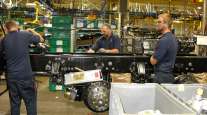Truck, Trailer OEMs Post Profits in Lackluster Equipment Market

This story appears in the May 1 print edition of Transport Topics.
Three of the world’s largest heavy-duty truck makers reported profitable financial results last week after also benefiting from their other lines of businesses and some insulation from the North American market.
Germany’s Daimler AG prospered because of its luxury cars, Sweden’s Volvo AB because of its construction equipment and U.S.-based Paccar Inc. because of business outside of the United States. and Canada.
And trailer maker Wabash National Corp. reported lower results due to a decline in trailer shipments that it attributed primarily to timing issues.
• Daimler, parent of U.S.-based Freightliner Trucks, Western Star Trucks and Detroit Diesel Corp., said on April 26 that its quarterly operating profit jumped at least 19%, year-over-year, at its five major divisions. There were also some one-time benefits to help bolster earnings to the equivalent of to $2.98 billion, or $2.70 a share, on sales of $41.31 billion, which was originally reported in euros. That compares with profits of $1.55 billion, or $1.39, on revenue of $36.68 billion in the same period the year before.
The truck division, Daimler’s second-largest behind Mercedes- Benz, earned $711.7 million in operating profit, up from $569.6 million, even though revenue declined by 3% to $8.46 billion. Unit sales fell 11% to 94,007 commercial vehicles.
While fewer trucks were sold, profits still rose primarily due to a gain from a real estate sale in Japan.
Operating margin for trucks improved to 8.4% from 6.3% in the year-ago quarter.
Daimler said of the North American market, “We expect a continuation of the cyclical market slowdown in the full year [2017]. An overall decrease in the magnitude of 5% is to be expected in Classes 6-8, and we anticipate an even more substantial weakening of demand in the segment of heavy-duty trucks.”
• Paccar, parent of Kenworth Trucks and Peterbilt Motors, returned to profitability but sales dipped 1.9%.
The Bellevue, Wash.-based company earned $310.3 million, or 88 cents, on revenue of $3.94 billion. A year earlier it lost $594.6 million, or $1.69, on sales of $4.01 billion, it said April 25.
Paccar’s three major segments — trucks, parts and financial services — remained profitable. New truck deliveries dropped in the United States and Canada and for the company as a whole, although they gained in the rest of the world.
A year-ago charge for $942.6 million was a settlement paid to the European Commission regarding Paccar’s DAF Trucks unit in Europe.
The company said it maintained its January estimate for U.S. and Canadian Class 8 retail sales at 190,000 to 220,000 units, about the same as 216,000 vehicles in 2016.
• Volvo generated most of its gains by its construction equipment division, as the larger truck division was fairly static.
While construction profits surged 374%, in part due to a stronger global mining industry, the truck unit encountered a varied market. It said Asia is expanding in terms of truck sales, Europe is stable and North American still falling, although net orders for new North American trucks are rising.
Corporatewide, Volvo earned the equivalent of $539.9 million, or 26.1 cents a share, on revenue of $8.67 billion. Year-ago net income was $447.9 million, or 21.9 cents, on sales of $8.48 billion.
At the global truck division, including North American brands Volvo Truck North America and Mack Trucks, operating profit rose 31%, as measured in Swedish kronor, to the equivalent of $550.4 million from $442.2 million.
Quarterly sales slipped to $5.55 billion from $5.68 billion. The strengthening U.S. dollar turned the krona-denominated increase into a dollar decrease.
Worldwide deliveries of Volvo Group trucks dipped 5% to 43,927 vehicles. Pricing improved, though, and the smaller number of vehicles sold turned into a revenue increase of 0.15%, year-over-year.
The source of quarterly improvement at the truck division came from providing services, which rose by 11%.
“After the downward correction in the long-haulage segment in 2016, the North American market seems to be bottoming out. We see positive signs of increased order activity,” Volvo CEO Martin Lundstedt said in the company’s April 25 report.
Volvo canceled planned North American stop days during the second quarter because of the stronger demand.
“We had originally planned to take some downtime at our New River Valley [Va.] assembly plant but have canceled those plans as a result of strengthened order support,” spokesman Brandon Borgna said.
• At Lafayette, Ind.-based Wabash, the trailer maker’s net income dropped 26% to $20.2 million, or 32 cents, compared with $27.5 million, or 42 cents, a year earlier.
However, operating income (earnings before interest and taxes) was $30.3 million, the second-best first-quarter performance in its history, trailing only the 2016 period, the company said.
Revenue fell 19% to $363 million, compared with $448 million the year before.
New trailer shipments declined to 10,400 compared with 14,000 a year earlier, and corresponding revenue fell 25% to $274.7 million, compared with $364 million.
“Performance targets in cost management and execution were achieved within both commercial trailer products and diversified products, as gross margins delivered were consistent with expectations previously communicated, despite trailer shipments slightly below prior guidance due strictly to timing of customer pickup,” Wabash CEO Dick Giromini said.
At the same time, its backlog grew to a “seasonally and historically strong” $863 million — up $61 million sequentially from the fourth quarter — which supports the company’s “long-standing belief” that market demand will be driven by trailer fleet age, regulatory compliance requirements and customer profitability, Giromini said.
“Product sales into the final- mile space continue to be robust as demand for truck body panels and decking systems remain strong,” Wabash President Brent Yeagy said April 25.
The company expects the truck body business to contribute more than $10 million of revenue this year.
Wabash will look at final-mile applications “as an opportunity to expand and grow the business,” Giromini said.
Wabash increased its full-year shipment guidance to 52,000 to 56,000 trailers, up 1,000 units from its prior guidance.
“Overall, a solid start to the year with strong margins and a favorable demand environment that appears to be strengthening further than what we anticipated at the year-end call,” Giromini said.



